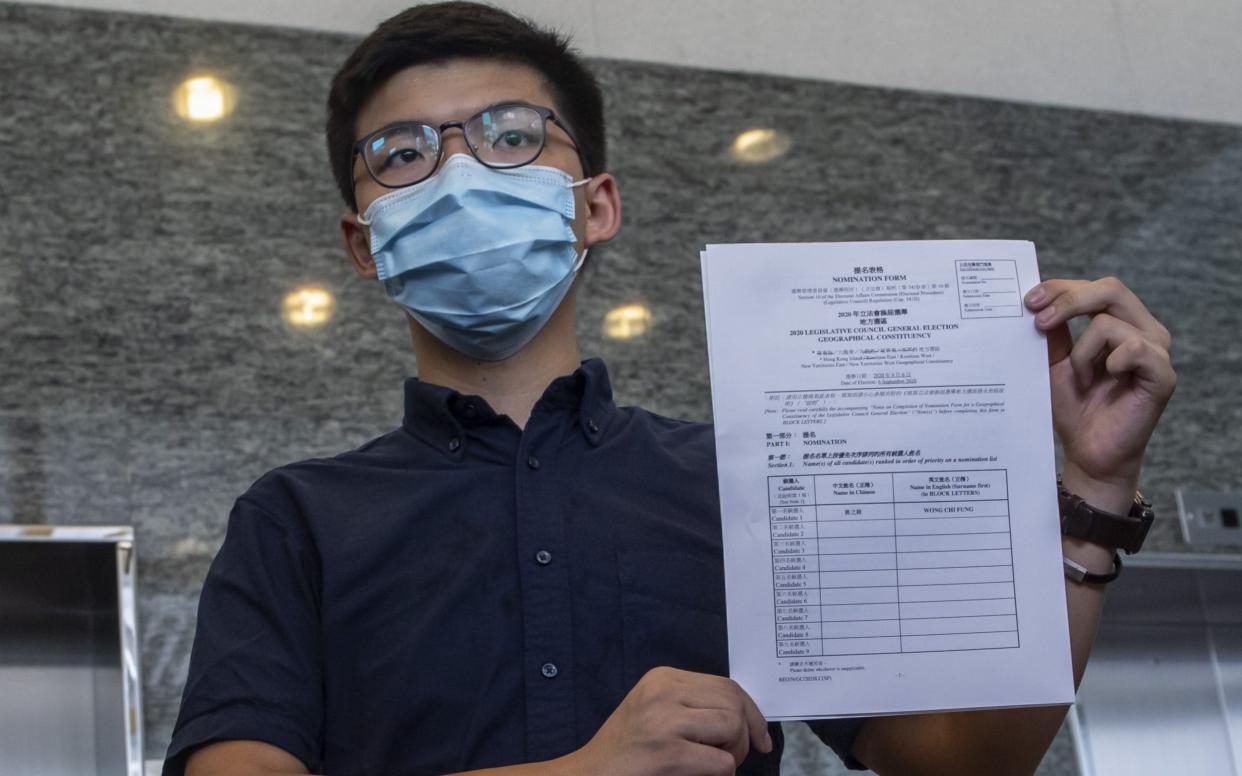Hong Kong bans Joshua Wong and 11 more pro-democracy campaigners from legislative council elections

Hong Kong yesterday banned 12 pro-democracy campaigners from standing in forthcoming elections to the city’s parliament as China stoked tensions by re-iterating its threat to refuse up to three million residents eligible for British travel documents the right to leave.
Carrie Lam’s Hong Kong administration, operating under Chinese rule, said the campaigners could not “genuinely” uphold the former UK colony’s mini-constitution because they oppose the imposition of Beijing’s draconian national security law. Those barred include Joshua Wong, founder of the now disbanded Demosisto Party, and Lester Shum.
It came as Liu Xiaoming, China’s ambassador to the UK, re-affirmed that China was considering not recognising the British National (Overseas) passport. Up to three million Hong Kong residents are eligible for the document, and Dominic Raab, the Foreign Secretary, has promised holding one would pave the way for residency in the UK.
Beijing imposed new legislation a month ago to introduce possible life sentences for ‘secession, subversion, terrorism, and foreign collusion’. The move threatens the ‘one country, two systems’ approach agreed when Britain handed control of Hong Kong back to China in 1997.
Mr Raab’s made the residency offer after new laws came into force. He later indefinitely suspended Britain’s extradition treaty with Hong Kong, and instituted an arms ban.
Ms Lam is suspected of wanting to cancel September’s elections to the legislative council. On Wednesday, she raised the prospect of postponing them because of s second wave of coronavirus, which, she said, threatened to overwhelm the territory’s hospitals.
Pro-democracy candidates, like Nathan Law, have previously been stopped taking up their seats in the council, but only after they have been elected. Mr Law is now in exile in London, opening up a new front in the pro-democracy strategy.
Mr Wong, a close ally of Mr Law, issued a defiant response. “I’m a bit surprised how they disqualified candidates without any notification. The Hong Kong legislature should not be the place to gather Beijing loyalists, but, right now, the pro-Beijing camp are just trying all their ways and tactics, hoping to kick us out from the election. But no matter what happens, I still have faith and trust in Hong Kong people.”
He shared on twitter an 18-page long letter from electoral officer Alice Choi, who said his resignation from Demosisto “was to avoid being caught under the newly passed national security law”. Mr Wong said: “The excuse they use is that I describe the national security law as a ‘draconian law’, which shows that I do not support this sweeping law.”
Dennis Kwok, another banned candidate, said: “They try to drive fear and oppression into our hearts and for this, we must not let them succeed. Do not give up.”
The Hong Kong authorities said in a statement: “There is no question of any political censorship, restriction of the freedom of speech or deprivation of the right to stand for elections as alleged by some members of the community.” More candidates may be banned.

In London, Mr Liu confirmed Beijing would be reviewing whether to allow Hong Kong residents to travel on the BNO passport. China’s foreign ministry had signalled that move last week. It would effectively maroon the passport holders.
Mr Liu blamed the dire state of China-UK relations firmly on Boris Johnson’s government. But he suggested the US had orchestrated the British approach, and pointed out Donald Trump was electioneering ahead of November’s presidential poll.
China have been stung by the furore over Hong Kong, the revocation of Huawei’s involvement in the new 5G network deal, and criticism over human rights abuses against the Uighur Muslims. Mr Liu devoted much of his press conference to justify Chinese action in Xinjiang.
Mr Liu said of Britain: "We threaten nobody. We just let you know the consequences. People regard some of my remarks as threatening words. I think they quote my remarks out of context.
"But, if you do not want to be our partners and our friends, you want to treat China as a hostile country, you will pay the price. That means you will loose the benefits of treating China as opportunities, as friends. And you will bear the consequences of treating China as a hostile country."

